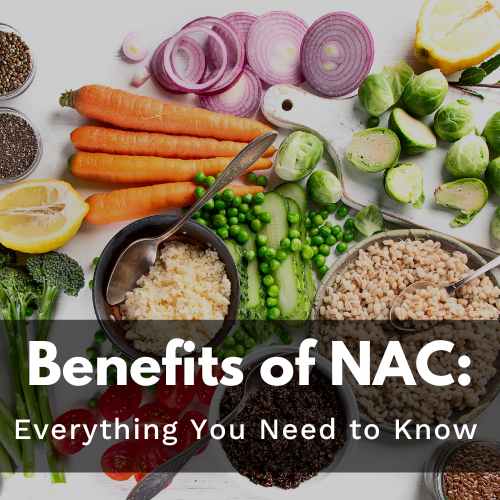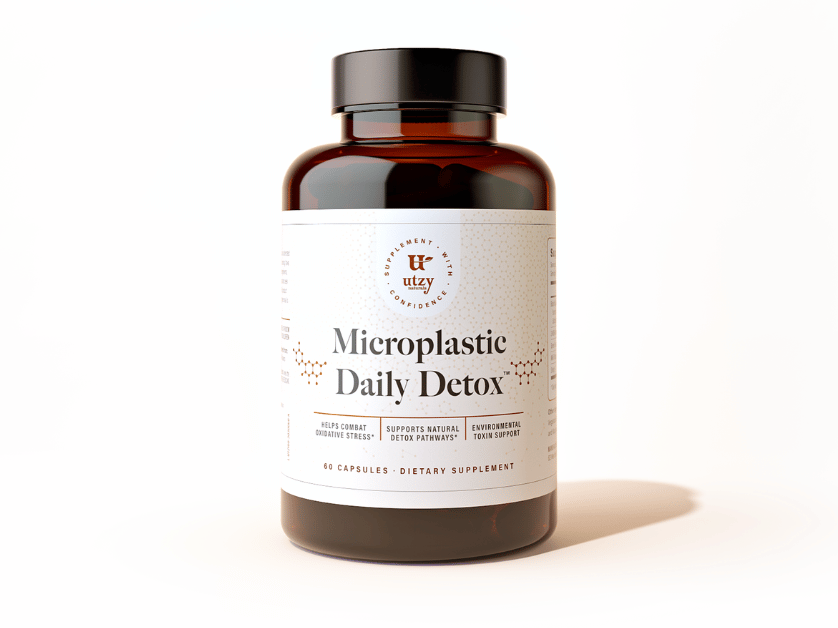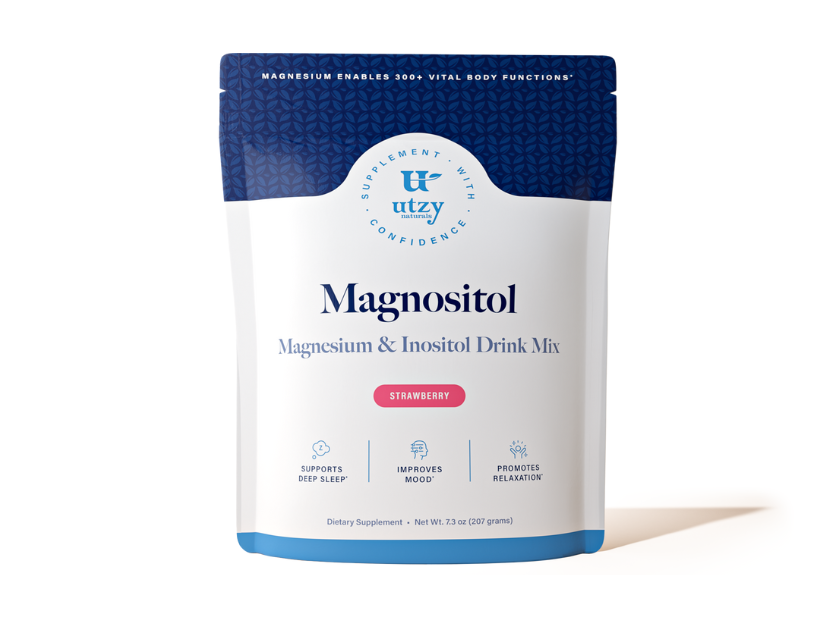shop
learn

NAC Benefits: Everything You Need to Know
September 21, 2023 5 min read
If you’re looking for a way to support your immune system, balance inflammation throughout your body, and support your brain health, you may want to try NAC. This supplement is a potent antioxidant that has multiple health benefits.
Keep reading to find out how NAC may support your health.

What is NAC?
N-acetyl cysteine (NAC) is derived from cysteine, an amino acid, or protein building block that is supportive of many metabolic functions.
In the body, NAC is converted from cysteine to glutathione, an antioxidant vital for muscle and tissue building and repair, immune system health, and detoxification.
Glutathione protects the body from damage caused by oxidative stress and free radicals, which can lead to a faster rate of aging.
Under normal conditions, the body can make cysteine from the food we eat. However, during periods of stress–such as pregnancy or recovery from illness – the body may become unable to synthesize cysteine, and it must be obtained from foods like eggs, poultry, garlic, onions, broccoli, and oats.
Benefits of NAC:
NAC has many proposed health benefits as research suggests that NAC may:
- Support detoxification*
- Restore glutathione levels
- Support respiratory function*
- Support brain health*
- Support heart health*
1. Supports Detoxification*
Every day, our bodies are exposed to toxins from the environment; as a result, natural bodily processes create waste. The kidneys, liver, colon, and lungs help remove toxins like carbon dioxide and uric acid from the body. But exposure to heavy metals like arsenic, lead, and mercury can prevent organs from doing their job.
A 2019 systematic review found that NAC may bind to heavy metals in the body and help it excrete them, helping prevent side effects caused by exposure to dangerous environmental toxins.
According to research, NAC is also FDA-approved for acetaminophen toxicity and may help protect against kidney and liver damage.
Even if you’re not being exposed to environmental toxins, NAC may give your hard-working organs a boost.
2. Restores Glutathione Levels*
NAC is a precursor to glutathione, a powerful antioxidant that helps support immune system function. It helps balance inflammation levels and oxidative stress, the accumulation of free radicals in the body’s cells.
Inadequate glutathione production is linked to premature aging. Supplementing with precursors of glutathione is shown to help maintain healthy levels of the antioxidant, which decline naturally with aging.
Research suggests that due to NAC’s antioxidant properties as well as its role in replenishing glutathione, it may support overall health and wellness.
3. Supports Respiratory Function*
NAC has been used to support respiratory function worldwide for over 50 years.
For people who experience excess airway mucus, NAC helps reduce oxidative stress and tissue damage by working as an expectorant to thin and loosen mucus.
Because it promotes the production of glutathione, which is abundant in healthy lung tissue, NAC may provide extra support for healthy lung and airway function.
4. Supports Brain Health*
Research suggests that NAC may support overall brain health and mood.
A 2019 study published in the journal Molecules suggests that NAC supplementation may complement conventional therapies for brain health and function. This is likely due to NAC’s role in increasing glutathione production.
A small body of evidence points to NAC as a way to boost mood and support mental health. Still, more research is needed to corroborate this data.
Research into NAC’s role in helping with substance abuse disorders is promising. NAC supplementation may be associated with decreased desire or cravings to use in individuals with cocaine, alcohol, and marijuana use disorders.
Exciting developments into NAC’s brain-boosting potential continue as further research is conducted.
5. Supports Healthy Blood Sugar Levels*
According to researchers, more than two in five Americans are overweight. And being overweight – along with an inactive lifestyle – makes it harder for your body to keep your blood sugar levels stable.
Animal studies suggest that NAC may help to maintain healthy blood sugar levels within the normal range*. Further research is needed, but the results are promising–NAC may be an accessible way to support healthy blood sugar levels.
6. Promotes Heart Health*
Maintaining a healthy heart is essential for longevity and wellness. Oxidative stress keeps the heart from functioning optimally. Increasing your intake of antioxidants may help to reduce oxidative stress.
As we discussed previously, NAC enhances the production of the antioxidant glutathione, which research indicates may support heart health.
NAC Side Effects & Safety:
While NAC has promising benefits, it’s best to consult a healthcare provider before adding it to your diet. NAC is believed to be safe for most individuals, however, it should be avoided by pregnant or breastfeeding women.
Possible side effects include dry mouth, nausea/vomiting, and diarrhea.
Caution should be taken in those with asthma and bleeding disorders, and NAC should be avoided at least two weeks prior to surgery.
NAC should not be taken with nitroglycerin.
Conclusion:
In conclusion, N-acetyl cysteine (NAC) is a supplement with a wide range of potential health benefits. Derived from cysteine, it plays a crucial role in supporting various metabolic functions in the body. One of its primary functions is to serve as a precursor to glutathione, a potent antioxidant that helps to support muscle and tissue repair, immune system health, and detoxification*.
Despite these potential benefits, it's crucial to exercise caution when considering NAC supplementation. Consultation with a healthcare provider is advisable, especially if you have pre-existing medical conditions or are pregnant or breastfeeding.
In summary, while NAC shows promise as a versatile supplement with various health benefits, it's essential to use it responsibly.

with a Journalism Degree from Rutgers University. She writes for Forbes and various other trusted sources. Based in Wilmington, North Carolina, Heidi Borst is a general fitness enthusiast with a passion for health and wellness.
References
N-Acetyl Cysteine (NAC). National Library of Medicine. Accessed 8/30/23.
Cysteine. University of Rochester Medical Center. Accessed 8/30/23.
Amino Acids. National Library of Medicine. Accessed 8/30/23.
Lopez MJ, Mohiuddin SS. Biochemistry, Essential Amino Acids. Treasure Island (FL): StatPearls Publishing; 2023 Jan-.
Cysteine. Association for the Advancement of Restorative Medicine. Accessed 8/30/23.
Cysteine. Mt. Sinai Health Library. Accessed 8/30/23.
Perricone C, DeCarolis C, et al. Glutathione. Reviews. 2009;8(8):697-701.
Why you should care about free radicals. Cleveland Clinic. Accessed 8/30/23.
Everyday Toxicology. Michigan State University Center for Research on Ingredient Safety. Accessed 8/30/23.
Heavy Metal Poisoning (Toxicity). Cleveland Clinic. Accessed 8/30/23.
Licata A, Minissale MG, et al. N-Acetylcysteine: A Comprehensive Review. Front Pharmacol. 2022 Aug;13:828565.
Reuter S, Gupta SC, Chaturvedi MM, Aggarwal BB. Oxidative stress. Free Radic Biol Med. 2010 Dec 1;49(11):1603-16.
Gould NS, Day BJ. Targeting glutathione responses in lung health. Biochem Pharmacol. 2011 Jan 15;81(2):187-93.
Metabolic Syndrome. Mayo Clinic. Accessed 8/30/23.
Dubois-Deruy E, Peugnet V, et al. Oxidative Stress for heart healt. Antioxidants. 2020;9(9);864.
Mirmiran P, Hosseini-Esfahani F, et al. Associations between dietary antioxidant intakes and heart health. Sci Rep 2022;12:1504.
Matuz-Mares D, Riveros-Rosas H, et al. Glutathione Participation in heart health. Antioxidants (Basel). 2021 Jul;10(8):1220.
Rossignol DA. The Use of N-Acetylcysteine as a Chelator for Metal Toxicity. The Therapeutic Use of N-Acetylcysteine (NAC) in Medicine. 2019;169-179.
Ballatori N, Krance SM, et al. Glutathione dysregulation and the etiology and progression of human diseases. Biol Chem. 2009 Mar;390(3):191-214.
Tenório MCDS, Graciliano NG, et al. N-Acetylcysteine (NAC): Impacts on Human Health. Antioxidants (Basel). 2021;10(6):967.
Calverley P, Rogliani P, Papi A. Safety of N-Acetylcysteine at High Doses for lung health: A Review. Drug Saf. 2021 Mar;44(3):273-290.
Tardiolo G, Bramanti P, Mazzon E. Overview on the Effects of N-Acetylcysteine for brain health. Molecules. 2018 Dec 13;23(12):3305.
Bradlow RCJ, Berk M, Kalivas PW, Back SE, Kanaan RA. The Potential of N-Acetyl-L-Cysteine (NAC) for brain health. CNS Drugs. 2022 May;36(5):451-482.
Tomko RL, Jones JL, Gilmore AK, Brady KT, Back SE, Gray KM. N-acetylcysteine: A potential for mental health. Curr Psychiatr. 2018 Jun;17(6):30-36, 41-42, 55.
Overweight and Obesity Statistics. National Institutes. Accessed 8/30/23.
Ma Y, Gao M, Liu D. N-acetylcysteine supports heart health in mice. Pharm Res. 2016 Aug;33(8):2033-42.
Leave a comment
Comments will be approved before showing up.
Also in Health
Subscribe
Sign up to get the latest on sales, new releases and more …
Join the Utzy Naturals Club!
Sign up and get the latest on sales, new releases, and more...







